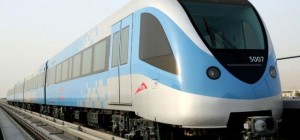By Jay B. Hilotin gulfnews.com
More passengers are expected to use the Dubai Metro with the Friday opening of the Jebel Ali station, next to an industrial corridor where thousands of people work, potentially changing Dubai’s public transport scene.
 The Dubai Metro already carries an average of 170,000 passengers daily, driving private transport bus operators slowly out of business. It suggests that the world’s longest driverless train system had passed the “last-mile” hurdle by providing an affodable link between homes and workplaces at both ends of the rail network.
The Dubai Metro already carries an average of 170,000 passengers daily, driving private transport bus operators slowly out of business. It suggests that the world’s longest driverless train system had passed the “last-mile” hurdle by providing an affodable link between homes and workplaces at both ends of the rail network.
“Our business is down 50 per cent,” admitted Syed Kamran Ahmad, General Manager of Fancy Transport, which for years ruled the passenger transport business in Dubai. “You can’t beat the Metro, but the customers who stuck with us, we will continue to serve them,” he said.
The last-mile challenge is addressed by hundreds of red-and-white “feeder” buses of the Roads and Transport Authority (RTA). Competition from the Metro has already forced private bus operators to cut tariffs – from Dh600 to Dh400 a month for Dubai-based customers and from Dh900 to Dh600 for Sharjah customers.
The Metro has visibly eroded the years of dominance of bus operators like Fancy, Belhasa, Sun City and Al Zarooni which provide pick-and-drop services from old Dubai and Sharjah to Jebel Ali Free Zone (Jafza) and nearby industrial areas.
An estimated 6,600 Jafza firms employ nearly 130,000 workers, including about 40,000 who live within the zone. About half of those who used buses daily to work on either side of the Shaikh Zayed Road freeway have switched to the Metro, cutting the number of diesel buses on Dubai’s roads.
To cope with the loss, Kamran said they have boosted their school bus services and also started offering “feeder bus” transport to private companies for their workers. “We will provide service to whoever needs it,” he said.
For the public, the switch to trains makes sense. On Monday, Vijay Kumar, a 33-year-old Indian worker, hopped onto a bus from Ibn Battuta to his Jafza camp after taking a train from Airport Terminal 1 at 6am, having just landed from Hyderabad a few hours earlier. The cost: under Dh10, about one-tenth the cost of a cab ride.
From 6am, the Ibn Battuta Metro station bustles with passengers. Raju, a 30-year-old office worker who lives in Deira, switched to the train three months ago after using his company bus service for a year. “I just have to endure the crowds on the train during peak hours,” he said. With clockwork precision, RTA buses come and go every few minutes from the busy station, bringing previously hard-to-reach places such as Green Community, Dubai Industrial Park, the International Media Production Zone, Dubai Lagoons and the massive Jafza within reach of more people.
NEW FEEDER BUS
Meanwhile, a new feeder bus route – F54 – will serve the Jafza Jebel Ali Metro station which opens on Friday. Mohammad Abu Bakr Al Hashemi, Director of Business Development of RTA’s Public Transport Agency, said it will link hundreds of companies to the Metro as the buses make dozens of stops along the way.
“Buses are playing an effective role in connecting people all over Dubai,” he said. The new routes will beef up six existing feeder buses (F43, F44, F46, F48, F53) plying from Ibn Battuta and two urban bus routes (X92 and 99). Al Hashemi said there are also plans to modify Route 99 within Jafza and to operate it from Jafza Jebel Ali Metro Station.
















